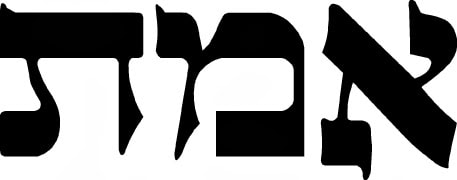 Rabbi David Etengoff Dedicated to the sacred memories of my mother, Miriam Tovah bat Aharon Hakohen, father-in-law, Levi ben Yitzhak, sister-in-law, Ruchama Rivka Sondra bat Yechiel, sister, Shulamit bat Menachem, Yehonatan Binyamin ben Mordechai Meir Halevi, Shoshana Elka bat Avraham, the Kedoshim of Har Nof and Pittsburgh, and the refuah shlaimah of Yakir Ephraim ben Rachel Devorah, Mordechai ben Miriam Tovah, and the safety of our brothers and sisters in Israel and around the world. Our parasha contains the ethically-infused mitzvah, “mi’devar sheker tirchak” (“Distance yourself from a false matter,” Sefer Shemot 23:7, all Bible translations, The Judaica Press Complete Tanach). In his Torah commentary HaKatav Ve’Kabbalah, Rabbi Yaakov Tzvi Mecklenburg (1785-1865) raises a fundamental question regarding the phraseology of this commandment: “Why does the Torah use this indirect terminology, rather than the standard formulation, ‘lo tedabar sheker (do not tell a lie)?’” I believe his answer informs our understanding of this Divine directive until the present moment: The reason the Torah changes the text of this commandment and does not say, ‘lo tedabar sheker,’ is quite clear. For in truth, there is no more commonly found violation of Torah law than telling a lie. This is illustrated in [Talmud Bavli, Sanhedrin 97a] chapter Chalek, wherein it states: ‘At first I thought there was no truth in this world.’ Rashi explains that this means, ‘There is no person who always speaks the truth.’ Therefore, the Torah uses the [highly unusual “distance yourself from a false matter”] formulation in order to create an even greater gap between ourselves and this violation. This is similar in kind to the often-cited Rabbinic expression, “Distance yourself from that which is reprehensible and from that which is similar in kind.” (Parashat Mishpatim 23:7, translation and brackets my own) The Maharal of Prague (Rabbi Judah ben Bezalel Loewe, 1520-1609) underscores the importance of the Talmudic phrase cited by Rav Mecklenburg, “At first I thought there was no truth in this world.” He suggests that its primary purpose is to stress the value of emet (truth): One must know that the essence of this expression is to make known the great value of emet, for everything that follows the truth is fitting to be permanent in nature. As our Sages taught us, “The truth remains, whereas a lie will not endure.” (Talmud Bavli, Shabbat 104a) This is the case, since truth is fitting for existence, and falsehood is destined for destruction. (Chidushei Aggadot, Talmud Bavli, Sanhedrin 104a, translation my own) In the Maharal’s estimation, emet is one of the constitutive elements of existence itself, for only that which is built upon truth will continue to endure. Little wonder, then, that the prophet Zechariah adjured our nation: “Speak the truth each one with his neighbor; truth, and judgment of peace you shall judge in your cities.” (8:16) Perhaps most important of all, when we seek to live lives that embody emet, we are emulating the Almighty Himself. As the prophet Yirmiyahu proclaimed: “…the L-rd G-d is emet (true)…” (10:10) The Talmudic sage, Rabbi Avun interprets Yirmiyahu’s use of the term, “emet,” in the following manner: “For He is the [eternally] living G-d and the King for all time.” (Talmud Yerushalmi, Vilna, Berachot 1:5) Rabbi Chanina further explicates the relationship that obtains between Hashem and emet when he teaches us, “The seal of the Holy One, blessed be He, is emet.” (Talmud Bavli, Shabbat 55a) In other words, emet is one of the markers of Hashem’s presence in the world, and, therefore, the standard by we should judge our daily actions. May the time come soon and, in our days, when the entire world will live in truth and recognize the one true Master of the Universe. V’chane yihi ratzon. Shabbat Shalom Past drashot may be found at my blog-website: http://reparashathashavuah.org They may also be found on http://www.yutorah.org/ using the search criteria of Etengoff and the parasha’s name. The email list, b’chasdei Hashem, has expanded to hundreds of people. I am always happy to add more members to the list. If you have family or friends you would like to have added, please do not hesitate to contact me via email mailto:[email protected]. *** My audio shiurim for Women on the topics of Tefilah and Tanach may be found at: http://tinyurl.com/8hsdpyd *** I have posted 164 of Rabbi Soloveitchik’s English language audio shiurim (MP3 format) spanning the years 1958-1984. Please click on the highlighted link.
0 Comments
Leave a Reply. |
Details
Archives
July 2024
AuthorTalmid of Rabbi Soloveitchik zatzal Categories |
- Blog: Rabbi David Etengoff: Parashat HaShavuah
- Sefer Bereishit 5784&5785
- Sefer Shemot 5784&5785
- Sefer Vayikra 5784&5785
- Sefer Bamidbar 5784 &5785
- Sefer Bereishit 5782&5783
- Sefer Shemot 5782&5783
- Sefer Vayikra 5782&5783
- Sefer Bamidbar 5782&5783
- Sefer Devarim 5782&5783
- Sefer Bereishit 5780& 5781
- Sefer Shemot 5780&5781
- Sefer Vayikra 5780&5781
- Sefer Bamidbar 578&5781
- Sefer Devarim 578&5781
- Sefer Bereishit 5778&5779
- Sefer Shemot 5778&5779
- Sefer Vayikra 5778&5779
- Sefer Bamidbar 5778&5779
- Sefer Devarim 5778&5779
- Sefer Bereishit 5776&5777
- Sefer Bereishit 5774&5775
- Sefer Bereishit 5772&5773
- Sefer Bereishit 5771&5770
- Sefer Shemot 5776&5777
- Sefer Shemot 5774&5775
- Sefer Shemot 5772&5773
- Sefer Shemot 5771&5770
- Sefer Vayikra 5776&5777
- Sefer Vayikra 5774&5775
- Sefer Vayikra 5772&5773
- Sefer Vayikra 5771&5770
- Sefer Bamidbar 5776&5777
- Sefer Bamidbar 5774&5775
- Sefer Bamidbar 5772&5773
- Sefer Bamidbar 5771&5770
- Sefer Devarim 5776&5777
- Sefer Devarim 5774&5775
- Sefer Devarim 5772&5773
- Sefer Devarim 5771&5770
 RSS Feed
RSS Feed
